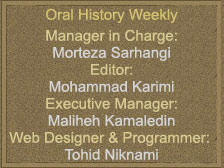| No. 230 | 29 November 2015 |
Student’s Movement in Isfahan (1)Interview with Mehdi HakakMehdi Hakak was admitted to the Industrial University of Tehran in 1977 to study Mechanics Engineering for a BS degree and he became one of the activists of students’ political movement. After graduation he has had many industrial posts and currently is a board member of Chemical Industry Investment Company. After thirty eight years he talks about his activities during first year at university.Pro-US Fans Perish Anti-UK MinisterInterview with Hussein Shah-HusseiniFollowing the coup, he stayed in his hideout and was arrested by Colonel Moulavi on Thursday, February 25, 1954. He was once assassinated during the Mossadeq administration by Fedayeen Islam supporters and was once attacked by Shaban Bimoq gangs and government hooligans, during which he was badly injured and was only saved by his sister before he was taken care of at the army's hospital to be prepared for a kangaroo court.Susangerd, Occupation, Liberation (1)Interview with Ghodratollah BahariSusangerd witnessed many changes in Mehr and Aban 1359. First, the city was occupied by Iraqis, then liberated and again was besieged and went up to the other conquest. Three operations were performed for liberating Susangerd. The first battle was not successful; in the second one the city was liberated and at the third one, its siege was raised. Ghodratollah Bahari was the commander of second battle.CALL FOR PAPERSThe Journal of Hate Studies: Hate and HeritageSpecial issueIn the spring of 2015, actor Ben Affleck appeared on PBS’s Finding Your Roots, hosted by Henry Louis Gates. In preparation for the show, which traces the genealogies of famous Americans, Affleck requested that information about his family’s ownership of black slaves be omitted from the broadcast, though details about Affleck’s more noble ancestors, including his mother, who was a Freedom Rider, were highlighted. When the omission was publically revealed, Affleck admitted that he was “embarrassed” by ancestors who owned slaves. “The very thought left a bad taste in my mouth,” he shared on Facebook.A Series of Symposia on Iranian Cultural History at New York UniversityIran: Animating the ArchiveOctober 2015-March 2016Following the 1979 Iranian Revolution, some official archives were destroyed for ideological reasons, others for espousing “improper culture,” and some simply to change the historical narrative. Nearly four decades after the Iranian Revolution, a new generation of Iran scholars are now researching the socio-cultural history of Iran in the years leading up to and following the Revolution, and are faced with a haphazard selection of resources. Oral History Weekly Magazine Aims and Regulations
Oral History Weekly Magazine wishes to create a suitable place for thoughts and idea development; Its main field would be “Oral History” and subjects as telling & writing memoirs, writing diaries, travelogues, chronologies, and all other subfields of history which are presented in the form of news, articles, reports, notes, interviews and memoirs can be included. There is no limitation on the length of would-be-sent materials. Mentioning the name, academic background and email is necessary. Articles with complete references and bibliography are more credited and an abstract would quite helpful. Weekly is not about to publish any material consisting insults and libels about other people or anything that brings anxiety to public opinion. Weekly can edit and translate the received materials. The published articles and materials are only the writer’s ideas and Oral History Weekly Magazine has no responsibility about their content. |
 Daughter of Sheena-59 Memories of Qadamkheyr Mohammadi Kanaan Wife of Sardar Shaheed Haj Sattar Ebrahimi Hajir Memory writer: Behnaz Zarrabizadeh Tehran, Sooreh Mehr Publications Company, 2011 (Persian Version) Translated by Zahra Hosseinian
Chapter Nineteen It was Esfand (March). Samad, who had gone to the front and it was supposed came back two or three days later, hadn’t still returned after twenty days. On the other hand, my father-in-law also hadn’t backed. It was a dismal afternoon. The children were watching television. It had been a little warmer. It was thawing little by little. Many had been prepared for house-cleaning, but I wasn’t in a mood for doing anything. I said to myself: “Samad backs today or tomorrow. I’ll be in mood for doing my works, when he comes back. We then both will do house-cleaning and also go shopping and buy new clothes for kids.” I remembered the skirt that I had bought it yesterday with my brother. Again I was worried. Why did it. Why I bought a black skirt for the Nowruz. Yesterday morning, my poor brother picked me and my children up and took us to the bazaar to buy clothes for New Year’s celebration. First I refused. “Samad himself will come and buy clothes for kids.” I said. He insisted. “Let's go then at least you buy something.” Finally he said, “I'm your older brother.” Still, near the feast of Nowruz, brothers buy something as a bonus for their sisters in the village customarily. I didn’t want to break his heart, but I don’t know how chose a black skirt among all those beautiful and colorful dresses. “Sister, do what you please, but it’s better to choose a colorful dress or blouse, or whatever else.” As if my brother didn’t like it too.    |
